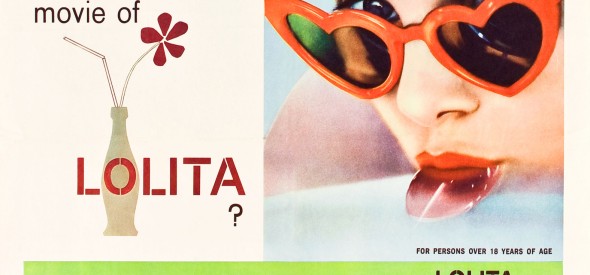The Last of Kubrick’s Early Films – Lolita
1April 20, 2012 by Admin

I wasn’t sure what to expect from Stanley Kubrick’s 1962 film version of Vladimir Nabokov’s 1956 novel about the consequences of sexual obsession, Lolita, and I wasn’t disappointed. That is to say, this is a very strange, unsettling, what’s-going-to-happen-next kind of story that is expertly turned even weirder under the direction of young Mr. Kubrick. He’s helped greatly by the wonderfully off-center, sometimes bizarre performances of Peter Sellers, Shelley Winters, Sue Lyon and best of all, James Mason as Humbert Humbert (a name that should have him trying to avoid bomber duty with Yossarian or trading for parachute silks with Milo Minderbender).

I haven’t read the book, but I am starting to read Vladimir Nabokov (Laughter in the Dark was a hoot and I recommend it), and will probably get to it eventually. I’m sure I’ll have the oddly creepy performance and voice of James Mason as the story’s protagonist in my mind as I read. This is, of course, the advantage/curse of seeing the film first.

Believe it or not, the damned thing was actually made into a Broadway musical by Alan Jay Lerner (of My Fair Lady) and John Barry (of James Bond). It was supposed to have been surprisingly good, but closed before it opened.
I’ll just let Mr. Nabokov have the last word about his story, “I would say that of all my books Lolita has left me with the most pleasurable afterglow—perhaps because it is the purest of all, the most abstract and carefully contrived. I am probably responsible for the odd fact that people don’t seem to name their daughters Lolita any more. I have heard of young female poodles being given that name since 1956, but of no human beings.”
Interestingly, Stanley Kubrick’s next film was Dr. Strangelove. He was off to the big time and never looked back….
Category Sight | Tags:
1 comment
Sorry, comments are closed.


Interesting that author Vladimir Nabokov endlsesly digressed on what was and wasn’t pornography. A moot point should be just that, why tire on about the subject? He states in a letter that his novel is a tragedy. There is nothing of the tragic in Lolita. The protagonist is a muddling, ineffective, fall away man. His particular reality finds him immersed in the ordinary, a book dusty gnat that needs shooing away. There is no tragedy in lust or acting on an urge. To play out a tragedy one needs an epic character or an epochal moment in time so as to frame out the rise and fall. Humbert Humbert is exactly that, two of the same name, two in the crowd and so banal you have to squint to actually see him.